
Trump vows to keep ‘communists and markers’ out of the US in latest gaffe
Donald Trump fumbled his words while speaking at his largest campaign event in Iowa on Friday. The former president appeared in Council Bluffs in the western part of the state that hosts the first caucus in approximately just over five months. Speaking about immigration, Mr Trump was relaying a campaign promise to deny entry to leftist ideologues when he accidentally referred to them as “communists and markers” rather than Marxists. Stumbling somewhat in his hurry to get to his next point — what can be done about those leftists already in the country — he then named a series of prominent elected Democrats with whom he has frequently sparred. Seeming to regain his rhythm, the former president then returned to his original point about immigration by saying he would “deny them access to our cunny”. Mr Trump has also said he would end birthright citizenship to those in the US illegally, as well as take a much harsher stance toward the southern border. Both the former and current presidents are of advanced age — Mr Trump is 77 and President Joe Biden is 80 — and such errors and flubs in speeches are common on the campaign trail and in office. Among his previous gaffes, Mr Trump once referred to Tim Cook, head of Apple, as Tim Apple; appeared to encourage people to treat Covid by injecting themselves with bleach; and asked that someone look at the “oranges” of the investigation into Russian collusion. For his part, some of Mr Biden’s slips of the tongue can be attributed to his struggle with a stutter, but he has forgotten words and names, referred to the war in Ukraine as the war in Iraq twice in 24 hours, and closed out recent remarks by curiously saying: “God Save the Queen.” Mr Trump often appears to let his temper and enthusiasm get the better of him in front of an audience, jumping from topic to topic when giving even prepared remarks while hurling out insults at his political rivals. Elsewhere in his speech on Friday, the former president also attacked Florida Governor Ron DeSantis as an enemy of corn-based ethanol. He criticised his top 2024 Republican presidential rival for voting as a member of Congress to oppose the federal mandate for the fuel additive that Iowa leads the nation in producing. Mr Trump declared himself “the most pro-farmer president that you’ve ever had” at the event, which was aimed at promoting his administration’s agricultural record and touting his oversight of clawbacks of regulations on farmers. “I fought for Iowa ethanol like no president in history,” he said. On a rainy Friday, Trump spoke to more than 1,000 Iowans and Nebraskans packed into the event hall inside Mid-America Center, with hundreds more huddled under umbrellas in line outside the arena. As a congressman from Florida, Mr DeSantis co-sponsored a bill in 2017 that would have immediately ended the renewable fuel standard, a position consistent with fiscal conservatives who see such mandates as government overreach. “Iowa also needs to know that Ron DeSanctus totally despises Iowa ethanol and ethanol generally,” Trump said, intentionally mispronouncing his rival’s name as he routinely does. “He’s been fighting it for years. Don’t forget, as a congressman he was voting against it, and fighting for years to kill every single job.” DeSantis’ campaign described the attack as a distortion. “As president, Governor Ron DeSantis will be a champion for farmers and use every tool available to open new markets,” campaign press secretary Bryan Griffin said in an emailed statement. With reporting by the Associated Press Read More Trump inadvertently reveals he’s never been to a Dairy Queen in viral video: ‘What the hell is a Blizzard?’ Ethics board recommends Rudy Giuliani be disbarred for ‘destructive’ attempts to undermine 2020 results Chris Christie says Trump took secret documents so he could keep pretending he was president White House attempts to explain Biden’s ‘God save the Queen’ remark Trump appears to wield infamous Sharpie to sign bond document at arraignment Tennessee can enforce ban on transgender care for minors, court says Trump investigations into classified papers and 2020 election have cost more than $9m Trump makes awkward ‘markers’ gaffe at farmers campaign event – latest
2023-07-09 01:18
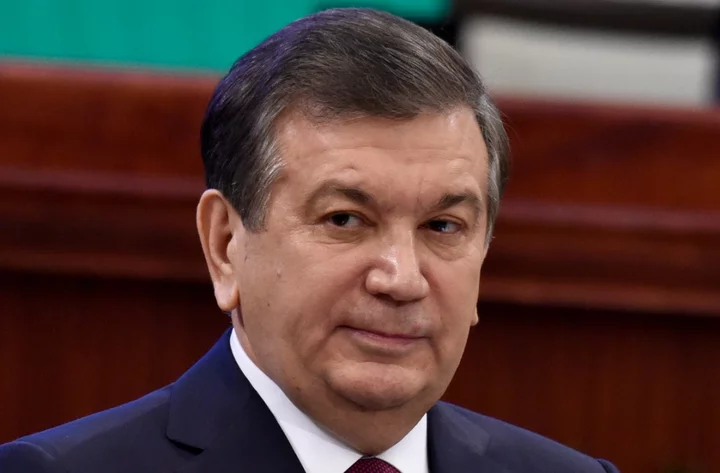
Uzbekistan's leader poised for landslide victory in presidential election
Uzbekistan holds a snap presidential election on Sunday, a vote that follows a constitutional referendum that extended the incumbent's term from five to seven years. President Shavkat Mirziyoyev was elected in 2021 to a second five-year term, the limit allowed by the constitution. But the amendments approved in April's plebiscite allowed him to begin the count of terms anew and run for two more, raising the possibility that he could stay in office until 2037. The 65-year-old Mirziyoyev is set to win the vote by landslide against three token rivals. “The political landscape has remained unchanged, and none of the parliamentary political parties stand in open opposition to the president’s policies and agenda,” the elections observer arm of the Organization for Security and Cooperation in Europe said in a pre-voting report. Since coming to power in 2016 after the death of longtime dictatorial leader Islam Karimov, Mirziyoyev has introduced a slew of political and economic reforms that eased some of the draconian policies of his predecessor, who made Uzbekistan into one of the region's most repressive countries. Under Mirziyoyev, freedom of speech has been expanded compared with the total suppression of dissent during the Karimov era, and some independent news media and bloggers have appeared. He also relaxed the tight controls on Islam in the predominantly Muslim country that Karimov imposed to counter dissident views. At the same time, Uzbekistan has remained strongly authoritarian with no significant opposition. All registered political parties are loyal to Mirziyoyev. In April’s referendum, more than 90% of those who cast ballots voted to approve the amendments extending the presidential term. As part of his reforms, Mirziyoyev has abolished state regulation of cotton production and sales, ending decades of forced labor in the country’s cotton industries, a major source of export revenues. Under Karimov, more than 2 million Uzbeks were forced to work in the annual cotton harvest. Mirziyoyev has also lifted controls on hard currency, encouraging investment from abroad, and he moved to improve relations with the West that soured under Karimov. He has maintained close ties with Russia and signed a number of key agreements with China, which became Uzbekistan’s largest trading partner as part of its Belt and Road Initiative. Like the leaders of other ex-Soviet Central Asian nations that have close economic ties with Moscow, Mirziyoyev has engaged in a delicate balancing act after Moscow sent troops into Ukraine, steering clear of backing the Russian action but not condemning it either. Read More Ukraine war’s heaviest fight rages in east - follow live Charity boss speaks out over ‘traumatic’ encounter with royal aide
2023-07-08 22:47
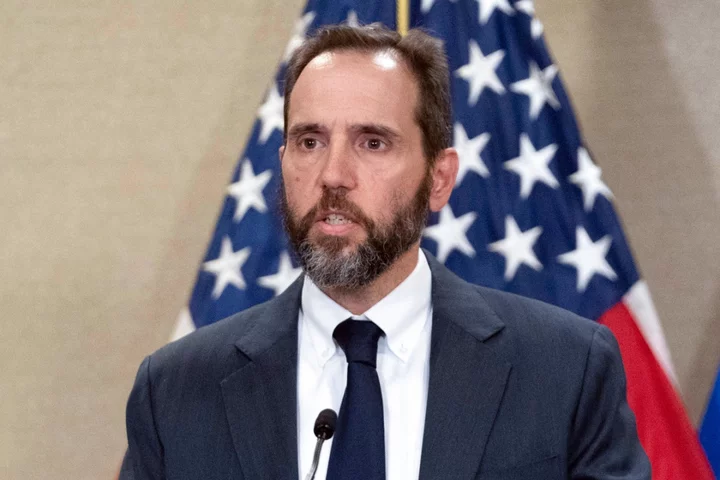
Trump investigations into classified documents and efforts to overturn election have cost more than $9m
Special Counsel Jack Smith's investigations of President Donald Trump's retention of classified records and efforts to overturn the results of the 2020 election have cost more than $9m over the first several months, according to documents released Friday. The special counsel's office spent more than $5.4m on things like employees' salaries, travel and transportation, rent, supplies and materials from Mr Smith’s appointment by Attorney General Merrick Garland in November 2022 through the end of March, Justice Department statement of expenditures show. Justice Department agencies spent another $3.8m to support the special counsel. Those expenses include the cost of the protective details for the special counsel's office as well as hours worked by agents and analysts on the probes. Mr Trump was indicted last month on 37 felony counts alleging he illegally kept classified records at his Mar-a-Lago estate in Florida and refused government demands to give them back. Mr Trump and his valet, Walt Nauta — who was charged alongside the former president — have both pleaded not guilty. Mr Trump has denied any wrongdoing and slammed the prosecution as an attempt to hurt his bid to reclaim the White House in 2024. Mr Smith has also been digging into efforts by Mr Trump and his allies to undo President Joe Biden's election victory. Since Mr Smith’s appointment, he has cast a broad net in demanding interviews and testimony related to fundraising,Mr Trump’s rally that preceded the US Capitol riot on 6 January 2021, and communications between Trump associates and election officials in battleground states. In December, Mr Smith subpoenaed local election officials in Wisconsin, Michigan, Arizona and Pennsylvania, asking for communications with or involving Mr Trump, his 2020 campaign aides and a list of allies who were involved in his efforts to try to overturn the results of the election. Read More Trump news - live: Trump attacks DeSantis and makes awkward ‘markers’ gaffe at farmers campaign event More bad news for Trump as judge rules his son can be subpoenaed in Trump Organization case Chris Christie says Trump took secret documents so he could keep pretending he was president
2023-07-08 22:45
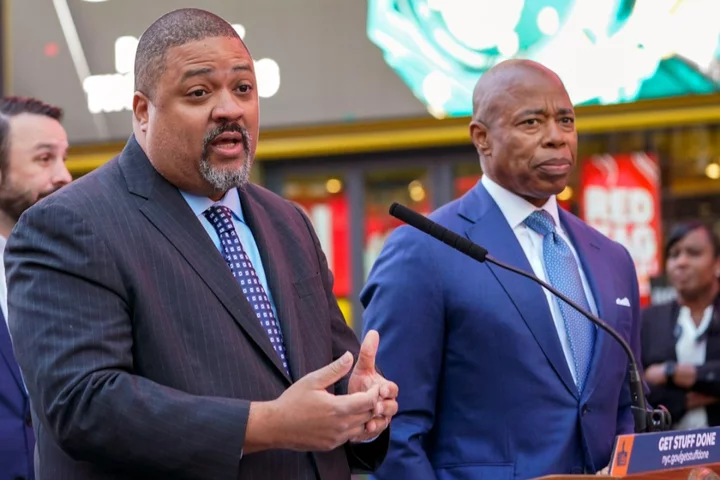
Six people charged in straw donor scheme to elect Eric Adams as New York City mayor
Six people were charged Friday in an alleged scheme to divert tens of thousands of dollars in public funds to New York City Mayor Eric Adams’ campaign months before his election. The indictment announced by Manhattan District Attorney Alvin Bragg does not implicate Mr Adams or any other city employees. Rather, it describes a straw donor scheme orchestrated by individuals with business before the city who hoped to maximize their donations to the future mayor in exchange for political favors. “We allege a deliberate scheme to game the system in a blatant attempt to gain power,” Mr Bragg said in a statement. “The New York City Campaign Finance Board program is meant to support our democracy and amplify the voices of New York City voters. When the integrity of that program is corrupted, all New Yorkers suffer.” Prosecutors said the scheme was led by Dwayne Montgomery, a former NYPD inspector currently listed as the director of integrity for the Teamsters Local 237, which represents municipal workers. According to the indictment, Mr Montgomery recruited friends and relatives to take advantage of the city’s generous matching funds system, which provides an eight-to-one match for the first $250 donated by a city resident. In addition to Mr Montgomery, the indictment names as defendants Shamsuddin Riza, Millicent Redick, Ronald Peek, Yahya Mushtaq, and Shahid Mushtaq. According to prosecutors, between 2020 and 2021, those who made donations in their own name were reimbursed by Mr Montgomery, who provided more than $40,000 of his money. He worked with a string of co-defendants to help recruit donors, including Mr Riza, who indicated he was hoping to secure work from the city. “FYI ! This is the one I want , Safety , Drywall , and Security one project but we all can eat,” Mr Riza wrote in a July 2021 email to Mr Montgomery, sending along the information for a construction project called Vital Brooklyn, prosecutors allege. Mr Montgomery also worked alongside a campaign representative to organize a virtual fundraiser for Mr Adams in August, 2020, prosecutors contend. The representative is not named in the indictment. None of the defendants could immediately be reached for comment. Mr Adams' campaign released a statement denying any involvement in the alleged scheme. “There is no indication that the campaign or the mayor is involved in this case or under investigation,” a spokesperson for Mr Adams’ campaign, Evan Thies, said in a statement. “The campaign always held itself to the highest standards and we would never tolerate these actions.” The defendants each face charges of conspiracy, attempted grand larceny, and offering a false instrument. Read More NYC Mayor Eric Adams accused of doctoring photo of police officer friend killed in the line of duty Ex-NYC mayor Bill de Blasio and wife are separating – but will still live with each other New York City's Rikers Island, facing possible federal takeover, found violating safety standards NYC mayor accused of doctoring photo of murdered police officer friend Ex-NYC mayor Bill de Blasio and wife are separating – but will still live together
2023-07-08 22:21
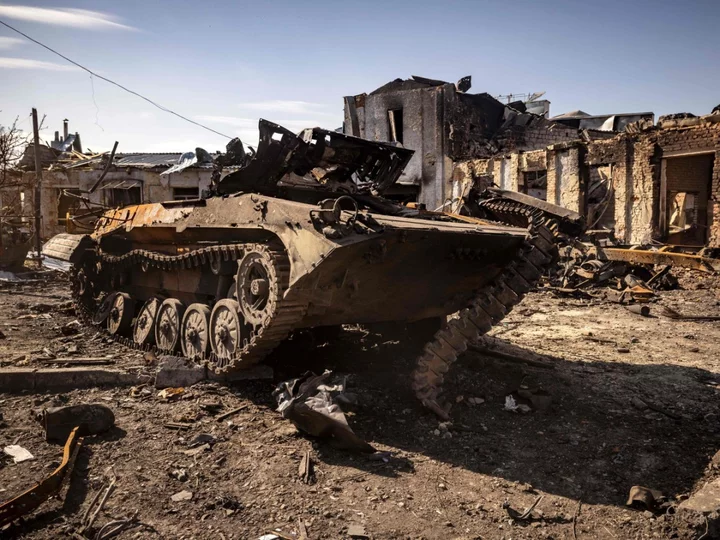
20 miles from the Russian border, one town struggles to move on from bloody occupation by Putin’s forces
Nobody believed the Russians would really invade, says Yuriy Bova, mayor of the small Ukrainian town of Trostyanets, just 20 miles from the Russian border – but 24 February 2022 will forever be etched in his mind. As Russian tanks trundled across the border in the early hours of the morning, there were no Ukrainian troops in Trostyanets – in Ukraine’s eastern Sumy region – and the residents of the town knew the enemy would arrive within hours. Bova says they tried as best they could to slow down the Russian advance. Felling trees onto the roads through the rolling hills and forests surrounding Trostyanets, brought one column of invading vehicles to a halt for two days. However, it wasn't enough. “There weren’t just four or five armoured vehicles, as we had imagined. Instead, there was another column with more than 100 vehicles, including up to 60 tanks and armoured personnel carriers, 20 troop-carrying trucks plus fuel tankers,” Bova says. The Russians rumbled into Trostyanets on the first day of the invasion, beginning a nightmare for the town’s 21,000 inhabitants. I'd heard about the plight of the town a month later, on 27 March – when it was freed from Russian occupation. In the intervening weeks, much of the town was destroyed, 49 of its people were killed and 13 others believed “disappeared” by the occupiers. I was in another area of Ukraine – and knew nobody in Trostyanets – but started to dial numbers I could find. The first person to answer was on a number for the “Hotel Trostyanets". The woman who answered, Tetyana Shevchenko, the hotel’s owner had just returned to her town. I could hear her trying to muffle her sobbing as she told me about how the hotel had been utterly trashed. Everything that could be stolen, such as TVs, fridges and air-conditioners, had been looted, while beds, furniture, even doors had been smashed. However, even while absorbing the destruction at the business she and her husband spent years building, Tetyana said she felt lucky compared to others whose relatives had been killed or homes had been reduced to piles of charred rubble. Such a refusal to surrender to despair is a trait that was to become ever more apparent across Ukraine. I finally managed to visit Trostyanets recently, more than 15 months into a war Moscow appeared sure would only last weeks. Hotel Trostyanets was easy to find on the town’s main street, standing intact as part of a row of burned and battered husks of buildings. The town, founded in 1660, contains onion-domed churches and a fortress enclosed by a stone white-painted wall, built in the mid-18th century. During the occupation, the Russians positioned heavy artillery inside, calculating – correctly – that Ukrainian forces would not target a structure listed as a historic treasure. The building was unscathed by Ukrainian shelling but its walls are peppered with bullet holes from machine-gun fire in a bile-filled farewell by the fleeing Russians. Every street bears some scars. The railway station and shops, restaurants and residential buildings that had fringed a large square and park are a scene of total devastation, with most of the structures blasted beyond redemption. The park is a churned-up mixture of tarmac and soil. Eerily perched at its centre, atop a high concrete pedestal, is a Second World War-era Soviet T-34 tank. One of its treads, hit by shellfire, trails limply. When the Russians arrived, they commandeered the hotel and kicked Tetyana out. She said they immediately set out to inspire terror in the town, whose people were often beaten or detained, without rhyme or reason. Many men were forced to strip at gunpoint and stand on the street throughout freezing nights, she says. “They intimidated people, looted shops. Soon they started rounding people up for torture. They used the basement at our railway station as a torture chamber, where they did whatever they wanted,” Tetyana adds. “They understood that we were frightened of them and they behaved even more arrogantly, they enjoyed it.” Two of her friends, a married couple, were riding bikes when the Russians shot at them without warning, says Tetyana. The woman died but the Russians “wouldn’t let her body be moved for burial and she lay there until the Russians left”. Tetyana is active in local politics and was head of the local election commission. She feared the Russians would eventually come for her and she and her daughter managed to leave in mid-March to western Ukraine. Both their husbands had previously left and were in the Ukrainian military. Tetyana and her husband started repairing their hotel as soon as the Russians left, using their savings – as well as help from the local authorities. She gives a wry smile as she shows a photo of the door of room number six, where a Russian scrawl indicates a Russian commander had stayed. The door will be part of a planned museum about the town’s occupation. The situation on the battlefield is now somewhat different. Ukraine has been pushing a counteroffensive to take other territory occupied by Russia in the south and east, and the border area not far from Trostyanets has become the centre of cross-border incursions by pro-Ukrainian forces. The bulk of these have been carried out by Russian partisans seeking to cause trouble for president Vladimir Putin. The Russian Belograd region, between two and three hours’ drive from Trostyanets into Russian territory, has faced shelling, as well as the raids. But Trostyanets had seen its own version of guerrilla activity during the Russian occupation. The mayor, Bova, relays how it worked. A powerfully-built compact man, Bova was born in Trostyanets and was formerly a businessman. He was first elected as a councillor when he was 24 and has been the town’s mayor for 18 years. British and American intelligence had warned the Ukrainian government that the Russians had prepared detailed lists of people in government, military, police, education, social activists, businesspeople and others they suspected would help organise resistance and who were marked for arrest or execution. Bova says: “I had to decide whether to stay in my office and wait to be arrested and taken away or perhaps killed. That would have been madness. Weapons were in short supply – we had just four machine guns. So we couldn’t fight with that.” He and his comrades established contact with the Ukrainian 81st Brigade operating in the area and they asked his people to provide intelligence on what was going on inside Trostyanets. “They said that would be much more valuable than any fight we could have put up at that time,” says Bova, who became commander of Trostyanets’s territorial volunteer forces. Some of the Ukrainian partisans stayed inside the town while Bova and others operated from bases in forests close to Trostyanets, gathering detailed information about the Russian forces – including where they ate and slept and where their heavy weapons and armoured vehicles were at any time. They also helped guide Ukrainian artillery firing at Russian positions. Ukrainian intelligence believes one of the first of the many Russian generals to be killed during this invasion died in Trostyanets. Bova secretly visited the town twice to show the partisans he was close by and boost morale. On 21 March last year, they and Ukrainian regular forces launched an attack on the occupying forces in an attempt to liberate the town. But after a fierce firefight they had to withdraw. Bova says quite a few Russians were killed but so was one of the partisans. However, Ukrainian forces were encroaching on the town and the demoralised Russians, fearing being surrounded, fled on the night of 27 March across the border into Russia. Bova speaks to me inside his office at the town’s main administration building which, he says, like other public and community buildings in the town, had been looted and wrecked by the Russians. “The Russians smashed and destroyed everything. Three days before they left they fired some 30 tank shells into our main hospital... They also deliberately destroyed residential buildings. It was pure malice.” Bova suspects the 13 “disappeared” people were among those tortured beneath the railway station. Two prisoners were found alive in the basements as the Russians fled. They told of victims who bled to death after their fingers were cut off. Anguish flickers across Bova’s face as he recalls how the first thing the torturers demanded while beating their captives was his whereabouts. Since the town was liberated, Bova says he has worked tirelessly to rebuild Trostyanets. Electricity, water and heating systems were destroyed or ripped out. The town’s firefighting vehicles, ambulances, buses and any movable equipment was stolen. He said the Russians took even basic toolkits and wrecked what they could not take. He says all the tasks had to be performed in parallel – a huge logistical puzzle – and Bova reached out to and has been contacted by 130 organisations and groups around the world eager to help rebuild Trostyanets. In addition, scores of individuals have helped, many turning up unannounced to donate funds or supplies or roll up their sleeves to assist. He says everything from food, clothing and medicines to hospital apparatus, emergency vehicles and buses needed to be replaced “to return some semblance of normality”. “Today there are no homeless people in Trostyanets living under a tree,” he says. “Everyone has some roof over their heads.” But the tension never really leaves. The enemy is never out of reach, being so close to the border. Bova has a vision to rebuild Trostyanets using innovative designs from around the globe – taking into consideration factors such as the needs of elderly or disabled people and employing energy efficient and green technologies kind to the environment. “We know that we can’t invent everything ourselves when searching for new concepts,” he says. Therefore, he believes, to rebuild their country, Ukrainians need to forge partnerships with groups and individuals around the world to learn their approaches on incorporating culture, education parks and recreation into town planning. To that end he has traveled to the US, where among other projects he is seeking to adapt for Trostyanets “a new philosophy of park design” being developed by the city of Chattanooga in Tennessee. And last month he was in London for “The Ukraine Recovery Conference 2023” which was co-hosted by the UK and Ukraine and aimed at ensuring Ukraine can come back stronger from the devastation it has faced. Bova believes rebuilding Ukraine must begin even before the fighting is over. “We’ve mastered swiftly the technology of the new [Western] weapons we’ve been given. This is a people who didn’t break despite the horrors inflicted by the Russians and our nation is capable of swiftly mastering the technologies and ideas to rebuild our country.” He says so many people have died to ensure Ukraine survives and that it is “a duty to make every one of those sacrifices count – by building a new future they would be proud of and not recreating the past.” Read More The Body in the Woods | An Independent TV Original Documentary The harrowing discovery at centre of The Independent’s new documentary Sunak ‘discourages’ cluster bomb use after Biden agrees to send them to Ukraine Thousands march in Bosnia to mark 1995 Srebrenica genocide as ethnic tensions linger on Ukraine's president hails the country's soldiers from a Black Sea island to mark 500 days of war
2023-07-08 20:52

He was shot down in the Pacific Ocean in WWII. Almost 80 years later, his remains are finally home
Almost 80 years after Anthony Di Petta's plane was shot down by enemy fire in World War II and over 70 years after he was declared "non-recoverable," he's finally home.
2023-07-08 18:46
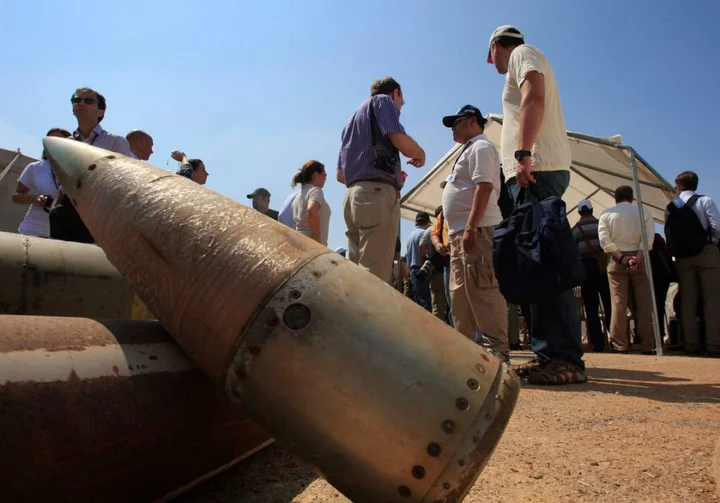
Cluster bombs: What are the controversial explosives and why is Biden sending them to Ukraine?
The United States has announced that it is sending cluster munitions to Ukraine to help its military push back Russian forces entrenched along the front lines. The administration of Joe Biden said that it will send thousands of them as part of a new military aid package worth $800m (£630m). The move will likely trigger outrage from some allies and humanitarian groups that have long opposed the use of cluster bombs. Proponents argue that both Russia and Ukraine have already been using the controversial weapon in Ukraine and that the munitions the US will provide have a reduced dud rate, meaning there will be far fewer unexploded rounds that can result in unintended civilian deaths. Ukraine has welcomed the decision, saying it needs “weapons, more weapons, and more weapons, including cluster munitions” if it is to defeat Russia. Mykhailo Podolyak, a senior adviser to the Ukrainian president, Volodymyr Zelensky, said the outcome of the war started by Moscow’s invasion depended on the volume of arms Kyiv receives. “In the great bloody war which has been ongoing for more than 16 months, and which will predetermine the future of the world … the number of weapons matters. So, weapons, more weapons, and more weapons, including cluster munitions,” he said on Friday. Here is a look at what cluster munitions are, why they are so controversial and where they have been used. What is a cluster munition? A cluster munition is a bomb that opens in the air and releases smaller “bomblets” across a wide area. The bomblets are designed to take out tanks and equipment, as well as troops, hitting multiple targets at the same time. The munitions are launched by the same artillery weapons that Western allies have already provided to Ukraine for the war — such as howitzers — and the type of cluster munition that the US is sending is based on a common 155 mm shell that is already widely in use across the battlefield. Why are they so controversial? In previous conflicts, cluster munitions have had a high dud rate, which meant that thousands of the smaller unexploded bomblets remained behind and killed and maimed people decades later. The US last used its cluster munitions in battle in Iraq in 2003, and decided not to continue using them as the conflict shifted to more urban environments with more dense civilian populations. On Thursday, Brigadier General Pat Ryder – the Pentagon press secretary – said the US Defense Department has “multiple variants” of the munitions and “the ones that we are considering providing would not include older variants with [unexploding] rates that are higher than 2.35 per cent”. A convention banning the use of cluster bombs has been joined by more than 120 countries, which agreed not to use, produce, transfer, or stockpile the weapons and to clear them after they've been used. The US, Russia and Ukraine haven't signed on. Why provide them now? For more than a year the US has dipped into its own stocks of traditional 155 howitzer munitions and sent more than two million rounds to Ukraine. Allies across the globe, including the UK, have provided hundreds of thousands more. A 155 mm round can strike targets 15 to 20 miles (24 to 32 kilometres) away, making them a munition of choice for Ukrainian ground troops trying to hit enemy targets from a distance. Ukrainian forces are burning through thousands of rounds a day battling the Russians. Yehor Cherniev, a member of the Ukrainian parliament, told reporters at a German Marshall Fund event in the US this spring that Kyiv would likely need to fire 7,000 to 9,000 rounds daily during the intensified counteroffensive. Providing that many puts substantial pressure on US and allied stocks. The cluster bomb can destroy more targets with fewer rounds, and since the US hasn’t used them in conflict since Iraq, it has large amounts of them in storage it can access quickly, said Ryan Brobst, a research analyst for the Foundation for Defense of Democracies. A March 2023 letter from top House and Senate Republicans to the Biden administration said the US may have as many as three million cluster munitions available for use, and urged the White House to send the munitions to alleviate pressure on American war supplies. “Cluster munitions are more effective than unitary artillery shells because they inflict damage over a wider area,” Mr Brobst said. “This is important for Ukraine as they try to clear heavily fortified Russian positions.” Tapping into the US stores of cluster munitions could address Ukraine’s shell shortage and alleviate pressure on the 155 mm stockpiles in the US and elsewhere, Mr Brobst said. Is using cluster bombs a war crime? The use of cluster bombs itself does not violate international law, but using them against civilians can be a violation. As in any strike, determining a war crime requires looking at whether the target was legitimate and if precautions were taken to avoid civilian casualties. “The part of international law where this starts playing [a role], though, is indiscriminate attacks targeting civilians,” Human Rights Watch’s associate arms director Mark Hiznay said. “So that's not necessarily related to the weapons, but the way the weapons are used.” Where have cluster bombs been used? The bombs have been deployed in many recent conflicts. The US initially considered cluster bombs an integral part of its arsenal during the invasion of Afghanistan that began in 2001, according to Human Rights Watch (HRW). The group estimated that the US-led coalition dropped more than 1,500 cluster bombs in Afghanistan during the first three years of the conflict. The Defense Department had been due to stop use of any cluster munitions with a rate of unexploded ordnance greater than 1 per cent, by 2019. But the Trump administration rolled back that policy, allowing commanders to approve the use of such munitions. Syrian government troops have often used cluster munitions — supplied by Russia — against opposition strongholds during that country’s civil war, frequently hitting civilian targets and infrastructure. And Israel used them in civilian areas in south Lebanon, including during the 1982 invasion. During the month-long 2006 war with Hezbollah, HRW and the United Nations accused Israel of firing as many as four million cluster munitions into Lebanon. That left unexploded ordnance that threatens Lebanese civilians to this day. The Saudi-led coalition in Yemen has been criticized for its use of cluster bombs in the war with the Iran-backed Houthi rebels that has ravaged the southern Arabian country. In 2017, Yemen was the second deadliest country for cluster munitions after Syria, according to the UN. Children have been killed or maimed long after the munitions originally fell, making it difficult to know the true toll. In the 1980s, the Russians made heavy use of cluster bombs during their 10-year invasion of Afghanistan. As a result of decades of war, the Afghan countryside remains one of the most heavily mined areas in the world. What has the White House said? The United States will provide Ukraine with cluster-style artillery rounds for use on their own territory to repel Russian invading forces, the White House has said. National Security Adviser Jake Sullivan told reporters on Friday that Kyiv has “provided written assurances” that it would use the controversial weapons “in a very careful way that is aimed at minimising any risk to civilians”. He said the Defence Department would provide further details on the next arms package that will be sent to Ukraine, but he pointed out that Kyiv’s forces are “firing thousands of rounds a day to defend against Russian efforts to advance and also to support its own efforts to retake its sovereign territory”. The national security adviser suggested the decision to provide Ukraine with cluster weapons already in US stocks was necessary to keep up a steady flow of arms for Kyiv’s defence. “We have provided Ukraine with a historic amount of unitary artillery rounds and we are ramping up domestic production of these rounds. We’ve already seen substantial increases in production, but this process will continue to take time, and it will be critical to provide Ukraine with a bridge of supplies. While our domestic production is ramped up,” he said. “We will not leave Ukraine defenceless at any point in this conflict period.” Mr Sullivan noted that Russia has been using their own version of cluster munitions, which are antipersonnel weapons that make use of small “bomblets” to maximise their effectiveness against massed troops, and pointed out that the Russian weapons have a high rate of failure which leaves the battlefield littered with unexploded ordinance. He added that the US-made shells that will be provisioned to Kyiv’s defence forces have a much lower failure rate, and said Ukraine’s government has committed to post-war de-mining that would prevent civilians from being harmed by unexploded submunitions, which in past conflict zones have lingered for years. While a 2008 treaty, the Oslo Convention on Cluster Munitions, has been signed by more than 100 nations which have agreed to ban the use of such weapons, neither the US, Russia, nor Ukraine are signatories to the treaty. What has the Pentagon said? Speaking at a Defence Department briefing on Friday, Undersecretary of Defence for Policy Colin Kohl said the next US arms package to Ukraine would include the Dual-Purpose Improved Conventional Munition, which is used both for anti-armour and anti-personnel purposes. “With this announcement, we will be able to provide Ukraine with hundreds of thousands of additional artillery ammunition immediately. This decision will ensure we can sustain our support for Ukraine by bringing us to a point where we are producing sufficient artillery ammunition on a monthly basis across the coalition,” he said. Both Mr Kahl and Mr Sullivan also contrasted Russia’s use of the weapons on Ukraine’s territory with Ukraine’s desire to use them to defend their own land. “When we look at what Ukraine would be doing with these weapons, as opposed to what Russia is doing with these weapons, we see a substantial difference. It doesn’t make it an easy decision, and I’m not going to stand up here and say it is easy,” Mr Sullivan said, adding that the US had deferred a decision on providing cluster munitions for quite some time because it “required a real hard look at the potential harm to civilians”. “When we put all of that together, there was a unanimous recommendation from the national security team, and President Biden ultimately decided — in consultation with allies and partners and in consultation with members of Congress — to move forward on this step,” he said. Mr Kahl admitted that the US has criticised Russia’s use of cluster munitions because they have been doing so indiscriminately, and with older, less reliable systems that cause more civilian casualties. But he said Kyiv has assured the US that they will not use the DPICMs rounds in civilian areas or urban environments, and they have also committed to recording where they are used to aid in cleanup efforts post-war. The Associated Press contributed to this report Read More Ukraine-Russia war – live: US to send cluster bombs to Kyiv for first time Biden to ‘compare notes’ with Sunak on Ukrainian fightback The ‘chip wars’ between the US and China will have far-reaching technological and military repercussions The Body in the Woods | An Independent TV Original Documentary The harrowing discovery at centre of The Independent’s new documentary
2023-07-08 17:21
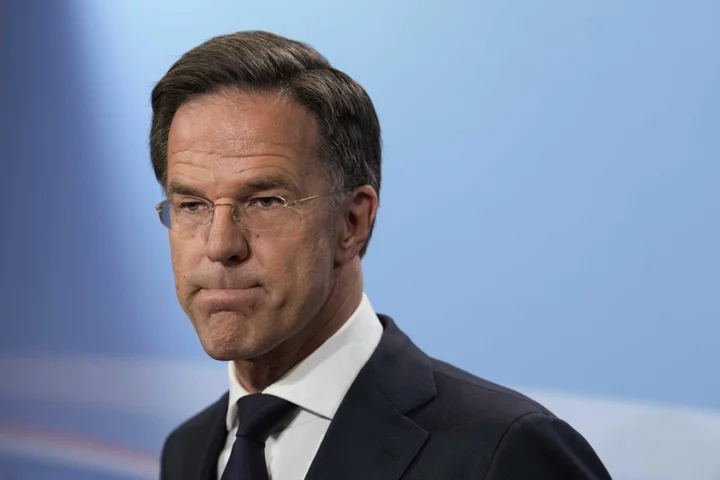
Dutch government collapses over ‘impossible to bridge’ differences on migration policy
The Dutch government has collapsed after failing to reach a conclusion on controlling high immigration rates. The four-party coalition government was unable to reach a consensus on talks about asylum policies that were led by prime minister Mark Rutte on Friday. Mr Rutte held an emergency cabinet meeting where he said he would hand in his resignation to King Willem-Alexander on Saturday. “The decision was very difficult for us”, Mr Rutte told reporters after announcing his cabinet’s resignation. The differences in views between the coalition partners were “irreconcilable”, he said. “All parties went to great lengths to find a solution, but the differences on migration are unfortunately impossible to bridge.” “The four parties decided that they cannot reach an agreement on migration,” said Tim Kuijsten, a spokesperson for the Christian Union party that was in coalition with Mr Rutte’s conservative VVD party. “Therefore they decided to end this government.” Mr Rutte’s party has in the past year been working towards reducing the flow of asylum seekers due to the issue of overcrowded migration centres in the Netherlands. Last year, hundreds of asylum seekers were forced to sleep outdoors in squalid conditions near an overcrowded reception centre as the number of people arriving in the Netherlands outstripped the available beds. Just over 21,500 people from outside Europe sought asylum in the Netherlands in 2022, according to the country’s statistics office. Thousands more moved to the Netherlands to work and study. The numbers have put a strain on housing that already was in short supply in the densely populated country. The coalition tried for months to hash out a deal to reduce the flow of new migrants arriving in the country of nearly 18 million people. The proposals on hand included creating two classes of asylum and reducing the number of family members allowed to join asylum seekers The two asylum classes were a temporary one for people fleeing conflicts and a permanent one for people trying to escape persecution. Mr Rutte’s coalition government had been in power for a year and a half. He has been Netherlands’s longest-serving prime minister and has been in office since 2010. Until a new government is elected, the current ministers will continue their work as a caretaker cabinet. Elections in the Netherlands will now reportedly take place in November this year. Additional reporting by agencies Read More Top BBC presenter taken off air ‘after paying teen £35,000 for explicit pictures’ Ukraine-Russia war – live: Zelensky’s forces make ‘significant gains’ against Putin in Bakhmut UK weather: Three-day ‘danger to life’ thunderstorm warning as temperatures soar to 30C How to rein in migration to the Netherlands is dividing the Dutch government The leaders of the Netherlands and Luxembourg tell Kosovo and Serbia to normalize ties for EU hopes Jens Stoltenberg’s term as Nato chief extended after Ben Wallace’s hopes dashed
2023-07-08 16:26
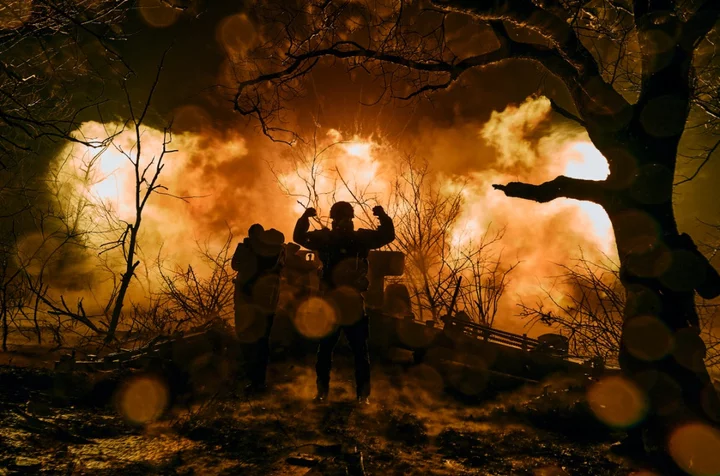
Ukraine-Russia war – live: US comments on Kyiv’s Nato membership prospects after cluster munitions deal
The White House weighed in on Ukraine’s potential Nato membership shortly after announcing that it will send controversial cluster munitions to the eastern European country. The munitions will be sent for the first time amid Ukraine’s ongoing war against Russia, as the conflict enters its 500th day this weekend and ahead of a Nato summit to be held next week in Lithuania. Turkey president Recep Tayyip Erdogan told Ukraine’s president Volodymyr Zelensky that his country ‘deserves’ to be in the Western bloc. White House national security advisor Jake Sullivan on Friday said the upcoming summit will underscore Nato’s readiness to consider Ukraine’s membership. Mr Sullivan, however, said Ukraine “will not be joining Nato coming out of this summit”. Meanwhile, he said Kyiv has “provided written assurances” that it would use the controversial weapons “in a very careful way that is aimed at minimising any risk to civilians”. A senior Ukrainian official previously said Ukraine would welcome the munitions from the US as they would have an “extraordinary psycho-emotional impact” on Russian forces. Read More US will provide Ukraine with cluster munitions, White House says Why the US is willing to send Ukraine cluster munitions now What are cluster munitions? The controversial weapons US will send to Ukraine How many casualties has Russia suffered in Ukraine?
2023-07-08 12:17
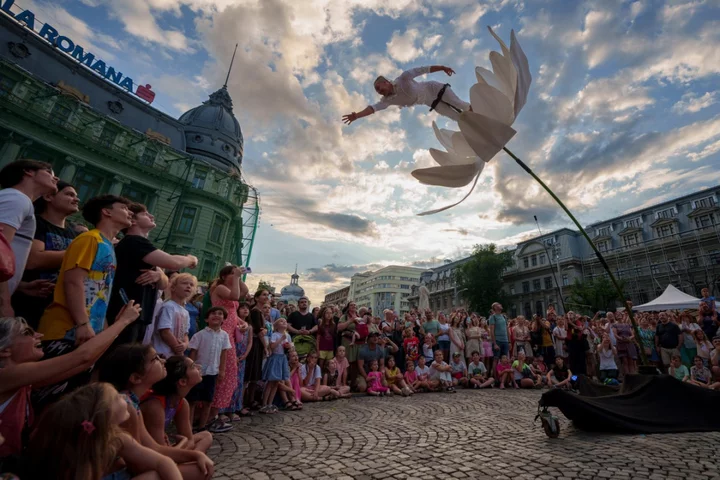
AP's Global Week in Pictures: July 1 - 7
July 1 - 7, 2023 Street artists performed across the Romanian capital, French protesters burned buses after a teenager was shot by police, Russia continued to attack Ukraine, Palestinians buried their dead after Israeli soldiers drove thousands form their homes, and people tried to stay out of the sun on the hottest days on human record. In the world of sports, cycles wizzed through forests on their Tour de France. This photo gallery highlights some of the most compelling images from around the world made or published by the Associated Press in the past week. The selection was curated by AP photo editor Leslie Mazoch in Mexico City. Follow AP visual journalism: Instagram: https://www.instagram.com/apnews/ AP Images on Twitter: https://twitter.com/AP_Images Read More Ukraine war’s heaviest fight rages in east - follow live Charity boss speaks out over ‘traumatic’ encounter with royal aide
2023-07-08 10:59
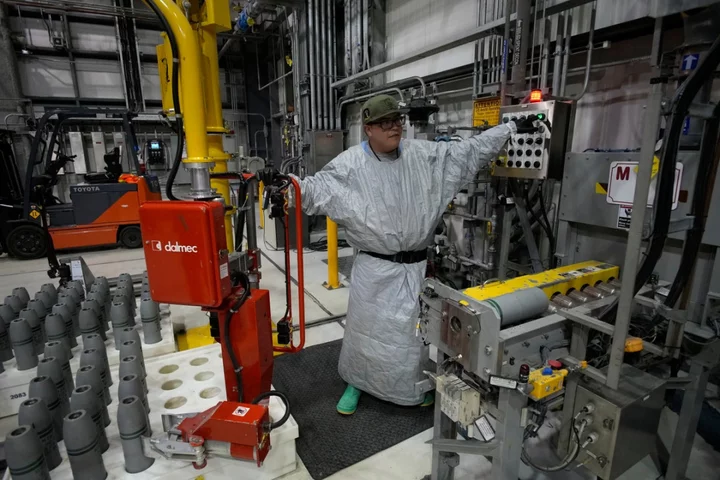
White House says US has destroyed its chemical weapons stockpile
The US on Friday announced it had completed the more than three-decade process of destroying its chemical weapons stockpiles. “Today—as we mark this significant milestone—we must also renew our commitment to forging a future free from chemical weapons,” Joe Biden said in a statement. “I continue to encourage the remaining nations to join the Chemical Weapons Convention so that the global ban on chemical weapons can reach its fullest potential,” he added. “Russia and Syria should return to compliance with the Chemical Weapons Convention and admit their undeclared programs, which have been used to commit brazen atrocities and attacks.” The US and Soviet Union agreed in 1989 in principle to destroy their stores of the deadly weapons, condemned following their widespread use in wartime atrocities in conflicts like World War I. Later, in 1997, the US Senate ratified the Chemical Weapons Convention. The US chemical weapons stock included cluster bombs and land mines with verve agent, mustard gas artillery shells, and poison that could be sprayed via jet, according to the New York Times. The effort to destroy the weapons was decades behind schedule and cost an estimated $42bn, according to the paper. “Chemical weapons are responsible for some of the most horrific episodes of human loss,” Senate Republican Leader Mitch McConnell of Kentucky said in a statement, the AP reports. “Though the use of these deadly agents will always be a stain on history, today our nation has finally fulfilled our promise to rid our arsenal of this evil. The news of the destruction of the stockpile comes as the US offloaded some of its other controversial weapons to Ukraine. The US will be sending cluster munitions to the country as part of a $800m aid package to help its beleagured armed forces fend off the Russia invastion. More than 120 countries, including numerous US allies in Europe, have joined a convention banning the use of such rounds, because they can cause a high number of civilian casualties. Read More U.S. destroys last of its declared chemical weapons, Senate Republican leader Mitch McConnell says Global chemical weapons watchdog says it found no evidence to back Syrian claim of 2017 gas attack US will provide Ukraine with cluster munitions, White House says The Body in the Woods | An Independent TV Original Documentary The harrowing discovery at centre of The Independent’s new documentary
2023-07-08 09:16

Republican 2024 Hopeful Scott Confident He Will Make Debate Cut
Republican presidential hopeful Tim Scott expressed confidence that he will meet his party’s eligibility requirements to participate in
2023-07-08 06:24
You Might Like...
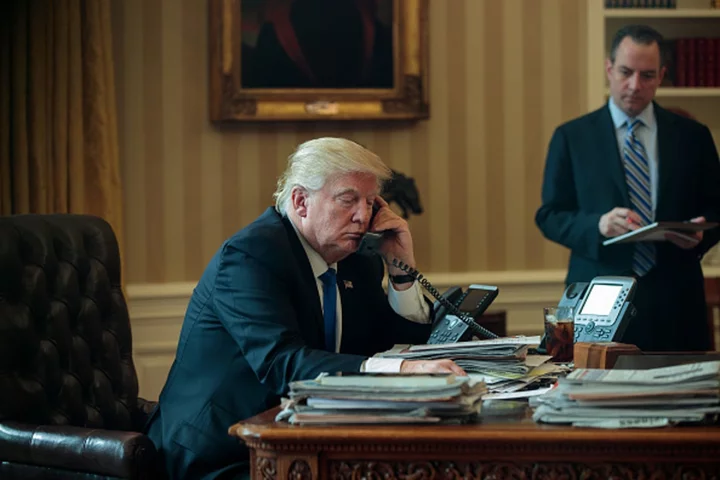
Trump news – latest: Trump to appear in court by video in hush money case as E Jean Carroll seeks new damages
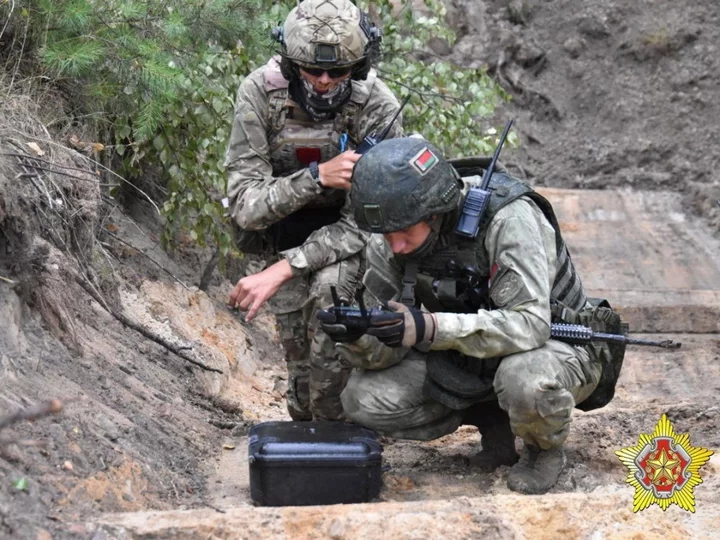
Wagner mercenaries training Belarus special forces just miles from border with Nato-member Poland
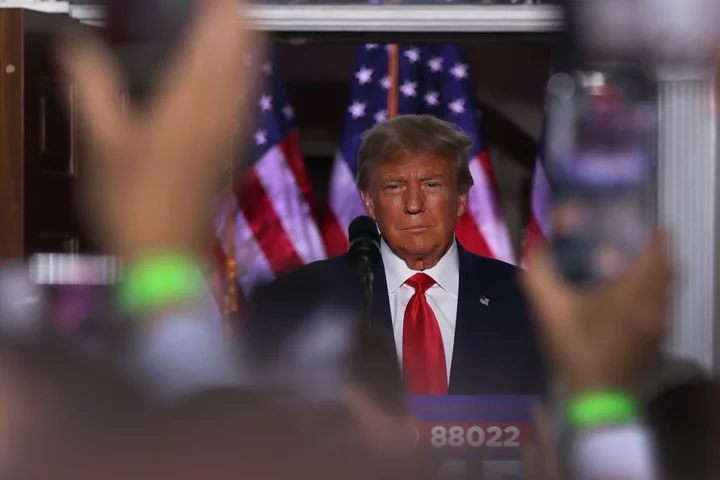
Georgia Grand Jury Returns Indictments Amid Trump Probe
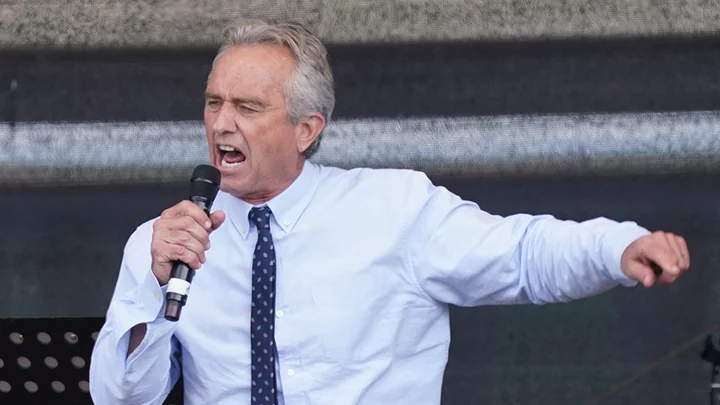
RFK Jr comes out against gun control and blames school shootings on ‘drugs’
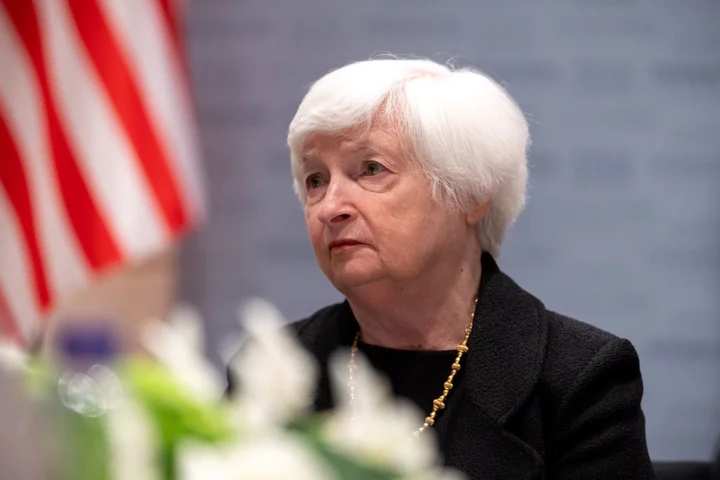
Yellen Hopes to Build on US-China Thaw at India G-20 Gathering
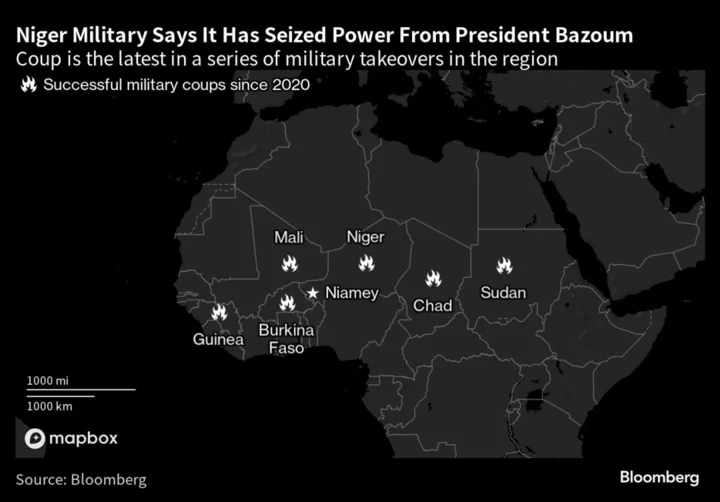
Niger Rally Supports Coup as Bloc Imposes Sanctions on Junta
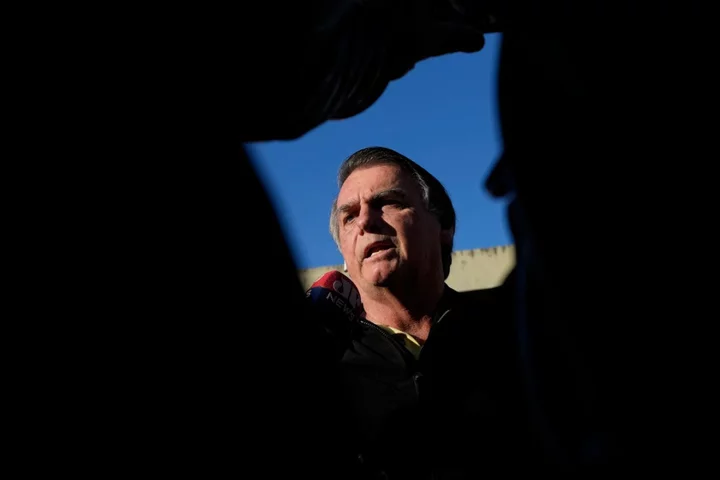
A Brazilian hacker claims Bolsonaro asked him to hack into the voting system ahead of 2022 vote

George Santos says Congress is like ‘Mean Girls’: ‘I’m Cady’
